Are you looking for a natural way to boost your energy levels and support your overall health? Look no further than vitamin B! This group of essential vitamins plays a crucial role in maintaining bodily function and promoting vitality. From aiding in energy production and cell health to supporting brain function and cardiovascular health, vitamin B offers a wide range of benefits. But how can you ensure you’re getting enough vitamin B in your diet? And what are the best food sources of this essential nutrient?
Key Takeaways:
- Vitamin B complex is a group of eight essential vitamins that play crucial roles in maintaining overall bodily function.
- Vitamin B is obtained through a nutritious diet and offers a wide range of benefits for vitality and well-being.
- By prioritizing the consumption of foods rich in B vitamins, individuals can ensure optimal vitamin B intake and support their overall health and energy levels.
- Vitamin B supplements may be necessary for certain individuals, and it is important to understand the recommended daily intake and potential risks of excessive intake.
- Vitamin B is especially important during pregnancy and may help manage energy levels and reduce the risk of birth defects.
Exploring the Composition of Vitamin B Complex
Vitamin B complex is composed of eight essential B vitamins, each with its own unique functions in the body.
Understanding the Eight Essential B Vitamins
The eight essential B vitamins that make up the vitamin B complex are:
- B1 (thiamine)
- B2 (riboflavin)
- B3 (niacin)
- B5 (pantothenic acid)
- B6 (pyridoxine)
- B7 (biotin)
- B9 (folic acid)
- B12 (cobalamin)
Each of these B vitamins plays a crucial role in maintaining overall bodily function.
Unique Roles of Each B Vitamin in Bodily Function
Each B vitamin in the vitamin B complex has its own unique function:
| B Vitamin | Unique Role |
|---|---|
| B1 (thiamine) | Aids in energy metabolism and nerve function |
| B2 (riboflavin) | Contributes to cell growth and red blood cell production |
| B3 (niacin) | Supports skin health and digestion |
| B5 (pantothenic acid) | Involved in hormone and cholesterol synthesis |
| B6 (pyridoxine) | Plays a role in brain development and function |
| B7 (biotin) | Important for healthy hair, skin, and nails |
| B9 (folic acid) | Helps with cell division and genetic material production |
| B12 (cobalamin) | Necessary for the formation of red blood cells and proper nerve function |
Understanding the unique roles of each B vitamin is crucial in appreciating the importance of consuming a balanced diet that includes sources of each vitamin.
Central Roles of Vitamin B in Body Functionality
Vitamin B plays a crucial role in maintaining overall health and vitality. These essential vitamins are involved in various bodily functions that contribute to the proper functioning of the body. Here are some of the central roles of vitamin B in body functionality:
1. Energy Production: Vitamin B is essential for converting the food we consume into cellular energy. B vitamins, such as thiamine, riboflavin, and niacin, play key roles in energy metabolism, helping to extract energy from carbohydrates, fats, and proteins.
2. Cell Metabolism: B vitamins are involved in the metabolism of cells, ensuring the proper functioning and growth of cells, tissues, and organs. They support DNA synthesis, cell division, and protein synthesis, contributing to overall cellular health.
3. DNA Synthesis and Repair: Vitamin B is necessary for DNA synthesis and repair, playing a vital role in the creation and maintenance of genetic material. This ensures the proper functioning and development of cells.
4. Nervous System Function: B vitamins, including thiamine, niacin, and cobalamin, play a crucial role in maintaining a healthy nervous system. They support nerve function, neurotransmitter production, and the transmission of signals between nerve cells.
5. Red Blood Cell Formation: Vitamin B, particularly cobalamin and folic acid, is essential for the formation of red blood cells. These cells carry oxygen to all parts of the body, supporting overall cardiovascular health and vitality.
6. Hormone Synthesis: B vitamins, such as pantothenic acid and pyridoxine, are involved in hormone synthesis. They play a role in the production and regulation of various hormones in the body, supporting hormonal balance and overall well-being.
7. Cardiovascular Health: B vitamins, including niacin, cobalamin, and folic acid, are important for maintaining cardiovascular health. They support the synthesis and metabolism of cholesterol, help reduce homocysteine levels, and contribute to the proper functioning of the heart and blood vessels.
8. Skin, Hair, and Nail Health: Vitamin B is essential for maintaining healthy skin, hair, and nails. B vitamins, such as biotin and riboflavin, support the growth, repair, and vitality of these tissues, promoting overall beauty and well-being.
By ensuring an adequate intake of vitamin B through a balanced diet or supplementation when necessary, individuals can support their body’s functionality and promote overall health and vitality.
The Impact of Vitamin B on Energy and Metabolism
Vitamin B plays a critical role in energy production and metabolism within the body. B vitamins are involved in converting the food we eat into cellular energy, specifically through the metabolism of carbohydrates, fats, and proteins. Thiamine, riboflavin, niacin, pantothenic acid, pyridoxine, and cobalamin are particularly important for energy production. These vitamins facilitate various enzymatic reactions in the body’s cells, helping to extract energy from the macronutrients we consume.
Adequate vitamin B intake is essential for enhancing metabolic efficiency, ensuring the body can efficiently utilize the energy derived from food. When vitamin B levels are insufficient, the body may struggle to produce energy efficiently, leading to fatigue and reduced metabolic function. By maintaining optimal levels of vitamin B through a balanced diet or supplementation when needed, individuals can support their energy levels and promote overall metabolic health.
How Vitamin B Fuels Cellular Energy Production
Vitamin B fuels cellular energy production through its involvement in key metabolic processes. For example, thiamine is essential for metabolizing carbohydrates, while riboflavin helps convert fats and proteins into energy. Niacin assists in the production of ATP, the body’s primary energy currency, and pantothenic acid contributes to the synthesis of coenzyme A, which plays a crucial role in energy production. Pyridoxine is involved in the breakdown and utilization of amino acids, further supporting energy metabolism in the body. Lastly, cobalamin is necessary for the production of red blood cells, which transport oxygen to body tissues and play a vital role in energy production.
Enhancing Metabolic Efficiency with Adequate Vitamin B Intake
Adequate vitamin B intake is essential for enhancing metabolic efficiency. By ensuring sufficient vitamin B levels, the body can effectively convert macronutrients into usable energy, supporting various physiological processes. This includes the efficient breakdown of carbohydrates, fats, and proteins, allowing the body to extract maximum energy from these nutrients. An optimal vitamin B intake can also prevent nutrient deficiencies that may impair metabolic function and lead to reduced energy production. Furthermore, vitamin B supports the proper functioning of enzymes involved in metabolism, enhancing overall metabolic efficiency and vitality.
Overall, vitamin B is a key player in energy production and metabolic processes within the body. By maintaining optimal vitamin B levels through a balanced diet or supplementation, individuals can optimize their energy levels, enhance metabolic efficiency, and support overall health and well-being.

Defining the Best Vitamin B Foods for Your Diet
When it comes to ensuring adequate vitamin B intake, incorporating a well-balanced diet that includes a variety of vitamin B-rich foods is essential. These foods serve as excellent natural sources of the essential B vitamins, providing numerous health benefits for your body and overall well-being. By including both animal-based sources and plant-based options rich in vitamin B in your diet, you can optimize your vitamin B intake and support your health.
Animal-Based Sources of Vitamin B
Animal-based sources of vitamin B are packed with essential nutrients and are a great addition to any diet. Incorporating these foods can help you meet your vitamin B needs and add flavor and variety to your meals. Some top animal-based sources of vitamin B include:
- Milk
- Cheese
- Eggs
- Liver
- Kidney
- Meat (such as chicken and red meat)
- Fish (such as tuna, mackerel, and salmon)
- Shellfish (such as oysters and clams)
- Poultry
These foods are not only delicious, but they also provide essential B vitamins that contribute to energy production, cell health, brain function, and more.
Plant-Based Options Rich in Vitamin B
If you follow a vegetarian or vegan diet or simply want to incorporate more plant-based options into your meals, there are plenty of vitamin B-rich foods to choose from. These plant-based foods are not only excellent sources of B vitamins but also provide a wide range of other essential nutrients. Some top plant-based options rich in vitamin B include:
- Dark green vegetables (such as spinach and kale)
- Beets
- Avocados
- Potatoes
- Whole grains and cereals
- Beans (such as kidney beans, black beans, and chickpeas)
- Nuts and seeds
- Fruits (such as citrus, banana, and watermelon)
- Soy products (such as soy milk and tempeh)
- Blackstrap molasses
- Wheat germ
- Yeast and nutritional yeast
These plant-based options are not only delicious and versatile but also provide the essential B vitamins needed for optimal health and vitality.
By incorporating both animal-based sources and plant-based options rich in vitamin B into your diet, you can ensure a well-rounded source of these essential vitamins. Experimenting with different recipes and trying new foods can make vitamin B-rich meals enjoyable, flavorful, and beneficial to your overall health.

Vitamin B Rich Foods and Their Impact on Health
Vitamin B-rich foods offer numerous health benefits due to the essential roles played by these vitamins in the body. A diet abundant in vitamin B foods can support cell health, red blood cell formation, brain function, digestion, hormone production, cardiovascular health, muscle tone, and overall vitality. Vitamin B-rich foods provide the necessary nutrients for energy metabolism, aiding in the prevention of anemia and enhancing overall energy levels. They also contribute to proper nerve function and the maintenance of healthy skin, hair, and nails. By incorporating a variety of vitamin B-rich foods into one’s diet, individuals can promote their overall health and well-being.

| Vitamin B Vitamin | Food Sources |
|---|---|
| Vitamin B1 (Thiamine) | Pork, whole grains, legumes |
| Vitamin B2 (Riboflavin) | Milk, yogurt, spinach, almonds |
| Vitamin B3 (Niacin) | Chicken, fish, peanuts, mushrooms |
| Vitamin B5 (Pantothenic Acid) | Avocado, mushrooms, sunflower seeds |
| Vitamin B6 (Pyridoxine) | Salmon, chickpeas, bananas |
| Vitamin B7 (Biotin) | Eggs, almonds, sweet potatoes |
| Vitamin B9 (Folic Acid) | Leafy greens, citrus fruits, legumes |
| Vitamin B12 (Cobalamin) | Beef, shellfish, fortified cereals |
By incorporating these vitamin B-rich foods into your diet, you can ensure you’re reaping the benefits of these essential vitamins and promoting your overall health and well-being.
The Significance of Vitamin B for Brain Health
Vitamin B plays a significant role in maintaining brain health and supporting cognitive function. The neurological benefits derived from B vitamins are crucial for proper brain development, communication between brain cells, and overall cognitive performance.
Research suggests that B vitamins, such as thiamine (B1), riboflavin (B2), niacin (B3), pyridoxine (B6), biotin (B7), and cobalamin (B12), have neuroprotective effects, meaning they help protect the brain from damage and degenerative conditions. These vitamins also aid in the production of neurotransmitters, which are essential for transmitting signals between brain cells and facilitating proper brain function.
Furthermore, B vitamins are involved in the synthesis of DNA and RNA, which are crucial for the formation and maintenance of brain cells. Adequate levels of B vitamins, particularly thiamine, riboflavin, niacin, pyridoxine, biotin, and cobalamin, are important for maintaining optimal brain function and preventing cognitive decline.
Recent studies have also suggested a connection between B vitamins and improved mental performance, memory, and mood. Individuals with sufficient intake of B vitamins may experience better cognitive abilities and a reduced risk of cognitive decline as they age.
To ensure optimal brain health, individuals should prioritize a balanced diet that includes foods rich in B vitamins, such as meat, fish, dairy products, whole grains, vegetables, and legumes. In cases where dietary intake may be insufficient, supplementation under the guidance of a healthcare professional may be necessary to meet the recommended daily intake of B vitamins.

| Vitamin B | Neurological Benefits |
|---|---|
| Thiamine (B1) | Supports nerve function and energy metabolism in the brain. |
| Riboflavin (B2) | Aids in the growth and repair of brain tissue and enhances brain cell communication. |
| Niacin (B3) | Supports the production of serotonin, a neurotransmitter that regulates mood and sleep. |
| Pyridoxine (B6) | Plays a crucial role in brain development, neurotransmitter production, and cognitive function. |
| Biotin (B7) | Contributes to myelin production, the protective coating around nerve fibers, facilitating efficient signal transmission. |
| Cobalamin (B12) | Aids in the formation of red blood cells and nerve cells, supporting brain function. |
By prioritizing the significance of vitamin B for brain health, individuals can support their cognitive well-being and promote optimal brain function throughout their lives.
Link Between Vitamin B and Cardiovascular Health
Vitamin B plays a significant role in maintaining cardiovascular health. The various B vitamins, such as niacin, pyridoxine, folic acid, and cobalamin, have been found to contribute to heart disease prevention and the maintenance of healthy cholesterol levels.
The Role of B Vitamins in Heart Disease Prevention
Research has shown that B vitamins play a crucial role in reducing the risk of heart disease. Specifically, vitamins like niacin, pyridoxine, folic acid, and cobalamin aid in lowering homocysteine levels, an amino acid that has been linked to an increased risk of heart disease.
By incorporating B vitamins into the diet or through supplementation, individuals can support heart health and reduce the risk of cardiovascular diseases.
Understanding B Vitamins and Their Influence on Cholesterol Levels
B vitamins also influence cholesterol synthesis, metabolism, and maintenance. These vitamins contribute to the production of good cholesterol (HDL) while reducing levels of bad cholesterol (LDL). By maintaining a healthy balance of cholesterol, individuals can support their cardiovascular health and reduce the risk of heart disease.

By prioritizing a diet rich in B vitamins or following a supplementation regimen under the guidance of a healthcare professional, individuals can support their cardiovascular health and reduce the risk of heart disease. It is crucial to incorporate vitamin B-rich foods or supplements into daily routines to ensure optimal intake and maintain healthy cholesterol levels.
Identifying and Addressing Vitamin B Deficiency
Vitamin B deficiency can have significant impacts on overall health and should be recognized and addressed promptly. Insufficient intake of vitamin B can lead to various health complications and symptoms that individuals should be aware of.
Recognizing the Symptoms of Insufficient Vitamin B Intake
- Skin rashes
- Cracks around the mouth
- Scaly skin on the lips
- Swollen tongue
- Fatigue
- Weakness
- Anemia
- Confusion
- Irritability or depression
- Nausea
- Abdominal cramps
- Diarrhea
- Constipation
- Numbness or tingling in the feet and hands
If experiencing these symptoms, it is important to consult with a healthcare professional to determine the cause and address potential deficiencies in vitamin B intake.
Dealing with the Risk Factors Leading to a Vitamin B Shortfall
Several risk factors can contribute to a shortfall in vitamin B intake. It is important to be aware of these risk factors to ensure adequate vitamin B levels:
- Strict vegan or vegetarian diets, as certain B vitamins are predominantly found in animal-based food sources
- Long-term medication use that may interfere with B vitamin absorption or increase requirements
- Gastrointestinal disorders that can affect nutrient absorption
- Certain health conditions like celiac disease or alcohol use disorder that can lead to malabsorption or increased nutrient requirements
By understanding these risk factors and addressing them through dietary adjustments or supplementation under the guidance of a healthcare professional, individuals can mitigate the risk of vitamin B deficiency and support their overall health.

Exploring the Importance of Vitamin B in Pregnancy
Pregnancy is a critical stage when ensuring optimal nutrition is essential for both the mother and the developing fetus. Vitamin B, particularly folic acid, plays a crucial role in fetal brain development and overall health. Adequate intake of B vitamins during pregnancy is vital in preventing neural tube defects in the developing baby.

In addition to its impact on fetal development, vitamin B also plays a role in managing energy levels and reducing the risk of complications like preeclampsia. This is especially important for pregnant individuals who may experience fatigue and increased energy demands.
It is recommended that pregnant individuals meet their daily intake of B vitamins through a well-balanced diet rich in vitamin B sources. This can include consuming foods such as leafy greens, fortified cereals, citrus fruits, legumes, and lean meats. However, in some cases, supplementation may be necessary to fulfill the increased nutrient needs during pregnancy. It is crucial to consult with a healthcare professional to determine the appropriate level of supplementation based on individual needs.
By prioritizing adequate vitamin B intake during pregnancy, individuals can support the healthy development of their baby and ensure their own well-being throughout this important stage of life.
Vitamin B Supplements vs. Natural Sources
While it is generally recommended to obtain the necessary B vitamins through a balanced diet, certain individuals may require supplementation to meet their specific needs. B vitamin supplements can be beneficial for individuals with restricted diets, such as strict vegans or vegetarians, or those with medical conditions that affect nutrient absorption. It is important to evaluate the need for supplementation under the guidance of a healthcare professional.
Evaluating When to Opt for Supplements Over Diet
There are several factors to consider when deciding whether to opt for vitamin B supplements over relying solely on natural food sources:
- Dietary Restrictions: Individuals following strict vegan or vegetarian diets may find it challenging to obtain sufficient B vitamins solely from plant-based sources. In such cases, supplements can help ensure adequate nutrient intake.
- Increased Nutrient Needs: Certain individuals, such as pregnant individuals, athletes, or those recovering from illnesses, may have higher nutrient requirements that cannot be met through diet alone. Supplements can help bridge the gap and support optimal health.
- Medical Conditions: Individuals with specific medical conditions, such as Crohn’s disease or celiac disease, may have impaired nutrient absorption. In such cases, supplements may be necessary to address nutrient deficiencies and support overall well-being.
Ensuring Proper Absorption of B Vitamins from Various Sources
Proper absorption of B vitamins is crucial to derive maximum benefit from both natural food sources and supplements. Factors that can influence the absorption of B vitamins include:
- Gastrointestinal Health: Maintaining a healthy digestive system is key to optimal nutrient absorption. Conditions such as inflammatory bowel disease or intestinal malabsorption can hinder the absorption of B vitamins.
- Age: As individuals age, their ability to absorb certain nutrients, including B vitamins, may decrease. Consulting a healthcare professional can help determine if supplementation is necessary to offset age-related changes in absorption.
- Medication Interactions: Some medications, such as acid reducers or anticonvulsants, can interfere with B vitamin absorption or increase the body’s demand for these vitamins. It is essential to discuss potential interactions with a healthcare professional.
How Much Vitamin B Do You Really Need?
The recommended daily intake of vitamin B varies depending on factors such as age, gender, and individual health conditions. The National Institutes of Health provide guidelines for the recommended daily intake of B vitamins for different demographics. For example, the recommended daily intake of B1 is 1.1-1.2 mg for women and men, respectively, while for B12, it is 2.4 mcg for adults. Pregnant individuals may have higher B vitamin requirements and should consult with a healthcare professional for personalized recommendations. Individuals with certain health conditions may also need to adjust their vitamin B intake based on their specific needs. It is important to be aware of these recommended daily intake guidelines to ensure optimal vitamin B intake and support overall health.
Recommended Daily Intake Across Different Demographics
Understanding the recommended daily intake of B vitamins for different demographics is crucial in ensuring proper nutrient intake. The table below provides an overview of the recommended daily intake of various B vitamins for different age groups and gender categories:
| B Vitamin | Recommended Daily Intake for Adults (19+ years old) | Recommended Daily Intake for Pregnant Individuals |
|---|---|---|
| Vitamin B1 (Thiamine) | 1.1-1.2 mg for women and men | 1.4 mg |
| Vitamin B2 (Riboflavin) | 1.1-1.3 mg for women and men | 1.4 mg |
| Vitamin B3 (Niacin) | 14-16 mg for women and men | 18 mg |
| Vitamin B5 (Pantothenic Acid) | 5 mg for adults | 6 mg |
| Vitamin B6 (Pyridoxine) | 1.3-1.5 mg for adults | 1.9 mg |
| Vitamin B7 (Biotin) | 30 mcg for adults | 30 mcg |
| Vitamin B9 (Folic Acid) | 400-600 mcg for adults | 600-800 mcg |
| Vitamin B12 (Cobalamin) | 2.4 mcg for adults | 2.6 mcg |
Adjusting Vitamin B Intake Based on Individual Health Conditions
Individuals with specific health conditions may require adjustments to their vitamin B intake. For example, individuals with malabsorption issues or gastrointestinal disorders may have difficulty absorbing B vitamins from the diet and may need higher doses or supplementation to ensure adequate intake. Additionally, certain medications can interfere with the absorption or utilization of B vitamins, necessitating higher intake to compensate. It is important to consult with a healthcare professional to determine the appropriate adjustments to vitamin B intake based on individual health conditions and specific needs.
Vitamin B’s Role in Stress Management and Mood Regulation
Vitamin B plays a crucial role in stress management and mood regulation. B vitamins, including thiamine, riboflavin, niacin, pyridoxine, and cobalamin, play a significant role in the production of neurotransmitters and the regulation of brain chemistry. These essential vitamins are key components in the body’s stress response system, helping to maintain a balanced mood and reduce the physiological effects of stress.
One important way that vitamin B supports stress management is through its involvement in the production of neurotransmitters such as serotonin, dopamine, and gamma-aminobutyric acid (GABA). These neurotransmitters help regulate mood, emotions, and stress responses in the brain. Adequate vitamin B intake ensures a healthy balance of these neurotransmitters, promoting a more positive outlook and reducing feelings of anxiety and stress.
Vitamin B also plays a vital role in supporting the body’s stress response system. During periods of stress, the body requires additional energy and resources to cope with the demands. B vitamins are essential for energy production, metabolism, and the synthesis of stress hormones such as cortisol. By ensuring sufficient vitamin B intake, individuals can support their body’s ability to respond to stress and maintain optimal energy levels.
Furthermore, vitamin B has been linked to mood regulation, with deficiencies in certain B vitamins associated with mood disorders such as depression and anxiety. Studies have shown that B vitamin supplementation can improve mood and reduce symptoms of depression. The synthesis of neurotransmitters and the regulation of brain chemistry, influenced by vitamin B, play a significant role in overall mood and emotional well-being.
To ensure sufficient vitamin B intake for stress management and mood regulation, individuals should incorporate a variety of B vitamin-rich foods into their diet. These include whole grains, leafy green vegetables, legumes, nuts, seeds, meat, fish, and dairy products. Supplementation may be necessary for individuals with specific dietary restrictions or higher nutrient needs.
Potential Consequences of Excessive Vitamin B Intake
While vitamin B is essential for overall health, excessive intake can have potential consequences. Over-supplementation with B vitamins can lead to risks such as peripheral neuropathy from high doses of vitamin B6, masking of vitamin B12 deficiency symptoms from excessive folic acid intake, and liver damage from high doses of niacin over a long period of time. It is crucial to avoid exceeding the recommended daily intake of B vitamins and to consult with a healthcare professional before starting any supplementation regimen. By being mindful of proper dosage and avoiding excessive intake, individuals can mitigate the risks of vitamin B toxicity and ensure the safe and beneficial use of these essential vitamins.
Excessive vitamin B intake can have harmful effects on the body. It is important to be aware of the risks associated with over-supplementation to maintain optimal health. Here are some potential consequences of excessive vitamin B intake:
Risks Associated with Over-Supplementation
1. Peripheral Neuropathy: High doses of vitamin B6 can lead to peripheral neuropathy, a condition characterized by numbness, tingling, and pain in the hands and feet. Excessive intake of vitamin B6 can cause nerve damage and should be avoided.
2. Masking of Vitamin B12 Deficiency Symptoms: Excessive folic acid intake can mask the symptoms of vitamin B12 deficiency, leading to undiagnosed and untreated deficiency. This can result in neurological complications, anemia, and other health issues.
3. Liver Damage: Long-term, excessive intake of niacin can cause liver damage. Elevated levels of niacin can lead to hepatotoxicity, which is harmful to liver health and function.
How to Avoid B Vitamin Toxicity
To prevent B vitamin toxicity and promote safe use, consider the following guidelines:
- Consult with a healthcare professional: Before taking any vitamin B supplements, consult with a healthcare professional to determine if supplementation is necessary and to determine the appropriate dosage.
- Follow recommended daily intake guidelines: Be mindful of the recommended daily intake of B vitamins and avoid exceeding those limits. Pay attention to the dosage recommendations on supplement labels.
- Choose reputable brands: When purchasing vitamin B supplements, opt for brands that are reputable and trusted. Look for products that undergo rigorous testing for quality and safety.
- Avoid self-diagnosis and self-medication: Do not self-diagnose vitamin deficiencies or attempt to self-medicate with high-dose B vitamin supplements without proper medical guidance. Work with a healthcare professional to determine your specific needs.
By following these precautions, you can ensure the safe and effective use of vitamin B supplements and minimize the risks of excessive vitamin B intake.
Interactions and Safety Concerns with Vitamin B Usage
When incorporating vitamin B supplements into your routine or consuming B vitamin-rich foods, it is crucial to be mindful of potential interactions and safety concerns. B vitamins can interact with certain medications, compromising their effectiveness or leading to adverse effects. It is important to consult with a healthcare professional to understand any potential interactions between B vitamins and medications you may be taking.
Understanding the Interaction Between B Vitamins and Medications
B vitamins have the potential to interact with various medications, including anticonvulsants, antacids, diuretics, and chemotherapy drugs. These interactions can affect the way medications work in your body, potentially leading to reduced efficacy or an increased risk of side effects. Consulting with a healthcare professional is essential to ensure that the combination of B vitamins and medications is safe and effective for your specific health needs.
Navigating Through Potential Side Effects and Risks
While B vitamins are generally safe for most individuals, excessive intake can lead to potential side effects. For example, high doses of niacin can cause skin flushing. It is important to follow the recommended daily intake guidelines for B vitamins and avoid exceeding safe dosage levels. Additionally, certain individuals may be more susceptible to side effects or have specific health conditions that require tailored vitamin B intake. Consulting with a healthcare professional can help you navigate potential side effects and risks associated with vitamin B usage.
By understanding potential interactions, following recommended dosages, and seeking professional guidance, you can use vitamin B safely and effectively. Prioritizing your health and well-being involves being mindful of potential risks and taking the necessary precautions to ensure a balanced approach to vitamin B supplementation.
Recent Scientific Discoveries Pertaining to Vitamin B
Ongoing scientific research continues to uncover new insights into the role and benefits of vitamin B. Recent studies have explored the association between vitamin B intake and various health outcomes, including heart health, brain function, and overall well-being. For example, some studies have suggested a potential link between B vitamins and a reduced risk of heart disease and stroke. Other research has investigated the impact of B vitamins on cognitive aging and the prevention of neurodegenerative diseases. By staying informed about the latest scientific discoveries pertaining to vitamin B, individuals can gain a deeper understanding of the potential benefits and applications of these essential vitamins.
Conclusion
Vitamin B is an essential group of vitamins that plays a crucial role in maintaining overall health and energy levels. By incorporating a variety of vitamin B-rich foods into one’s diet, individuals can ensure they are obtaining optimal levels of these essential nutrients. Foods such as meats, fish, dairy, whole grains, vegetables, and legumes are all excellent sources of vitamin B. However, it is important to consult with a healthcare professional to determine if supplementation is necessary to meet specific needs.
Understanding the recommended daily intake guidelines for vitamin B is crucial for achieving optimal health and energy levels. While vitamin B is necessary for our well-being, excessive intake can have potential risks. It is important to be mindful of proper dosage and avoid over-supplementation. Additionally, individuals should be aware of potential interactions between vitamin B and medications they may be taking.
By incorporating the right sources of vitamin B into one’s diet and balancing it with appropriate supplementation, individuals can unlock the numerous benefits of these essential vitamins. Vitamin B supports energy production, brain function, cardiovascular health, and much more. With proper intake and the guidance of a healthcare professional, individuals can optimize their vitamin B intake and promote their overall health and energy.
FAQ
What is Vitamin B complex?
What are the eight essential B vitamins?
What are the unique roles of each B vitamin?
What are the central roles of Vitamin B in body functionality?
How does Vitamin B contribute to energy and metabolism?
What are the best sources of Vitamin B?
What are the health benefits of Vitamin B-rich foods?
How does Vitamin B affect brain health?
What is the link between Vitamin B and cardiovascular health?
What are the symptoms of Vitamin B deficiency?
How important is Vitamin B during pregnancy?
When should one consider Vitamin B supplements?
What is the recommended daily intake of Vitamin B?
How does Vitamin B impact stress management and mood regulation?
What are the potential consequences of excessive Vitamin B intake?
Are there any safety concerns or interactions with Vitamin B usage?
What are the recent scientific discoveries pertaining to Vitamin B?
Source Links
- https://www.healthline.com/health/food-nutrition/vitamin-b-complex
- https://www.webmd.com/diet/health-benefits-b-complex
- https://www.everydayhealth.com/pictures/surprising-health-benefits-b-vitamins/


